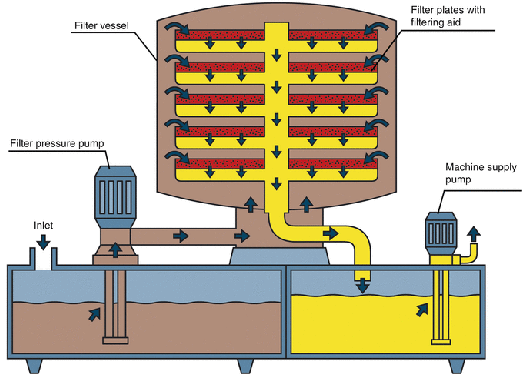Filtration and Maintaining Coolant Quality
Maintain & Improve Coolant Quality
Filtration is crucial in metalworking coolant systems to maintain and improve coolant quality for several reasons:
1. Particle Removal: Metalworking processes often generate particles, such as chips, fines, and abrasive particles, that can contaminate the coolant. Filtration helps remove these particles, preventing them from circulating in the coolant and causing damage to machinery, tooling, and workpieces.
2. Tool & Machine Protection: Contaminants in the coolant can lead to increased tool wear and damage to machining equipment. Filtration helps protect cutting tools, grinding wheels, and other machinery components by removing debris that could otherwise cause premature wear and reduce tool life.

3. Surface Finish & Dimensional Accuracy: Clean coolant contributes to better machining performance, resulting in improved surface finish and dimensional accuracy of the machined parts. Contaminants in the coolant can adversely affect the quality of the finished product.
4. Cooling Efficiency: Filtration helps maintain the thermal properties of the coolant. Clean coolant is more efficient at dissipating heat generated during metalworking processes. Efficient cooling is essential to prevent overheating of tools and workpieces, which can affect the machining process and the quality of the final product.
5. Extended Coolant Life: Filtration helps extend the life of the coolant by removing contaminants that can contribute to coolant degradation. Clean coolant lasts longer and requires less frequent replacement, reducing maintenance costs.
6. Corrosion Prevention: Metalworking coolants are susceptible to corrosion, especially in the presence of contaminants. Filtration helps reduce the likelihood of corrosion by removing particles and impurities that can contribute to the breakdown of the coolant’s corrosion inhibitors.
7. Improved Cutting Fluid Performance: In addition to removing particulate matter, filtration can also help maintain the chemical stability of cutting fluids by removing contaminants that may react with the fluid components. This contributes to the overall effectiveness of the cutting fluid in the metalworking process.
8. Environmental & Health Considerations: Filtration aids in meeting environmental and health regulations by reducing the discharge of contaminated coolant into the environment. Proper filtration can help industries adhere to environmental standards and ensure a safer working environment for operators.
In No Particular Order, Here Are 5 Coolant Filtration Companies:
(We do not sell any filtration equipment nor is there any consideration for the following mentions.)
- Hydro Engineering, Inc.: hydroblaster.com
- The Hilliard Corporation: hilliardcorp.com
- Sunnen Products Company: sunnen.com
- TBH North America: tbh.eu/us.html
- Industrial Fluid Systems, Inc.: industrialfluidsystems.com
